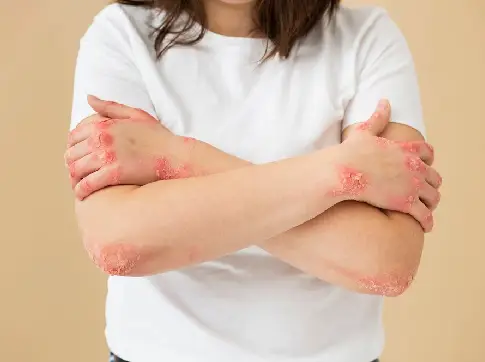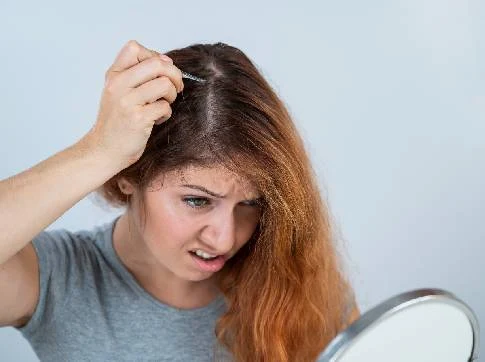All About Atopic Dermatitis in Detail by a Dermatologist
31 May 2024 Posted By Skinlogics
Atopic dermatitis (AD), or eczema, is the most prevalent inflammatory skin disease globally. It affects up to 15% of people at any given time in their lives. It typically affects people with an "atopic tendency," which means they have a history of hay fever, asthma, or food allergies or a family history of these conditions. It affects people of all ages and races.
Atopic dermatitis usually starts in infancy and affects up to one in every five children. Although it may go away in late infancy and adolescence, it affects 5–15% of young adults up to 26.
If you have this skin condition, this blog and video by our eczema treatment doctor in Noida at Skinlogics will help you get more details on this issue. It is important to address this skin issue with a dermatologist as they can rule out the causative agent of this disease and provide a suitable treatment plan to help your skin regain its health.
To watch our skin expert's informative video on atopic dermatitis, click here-
What are the risk factors causing atopic dermatitis?
The risk factors for eczema or atopic dermatitis include:
- Irritants include soaps, detergents, and other chemicals, heat; dust; woollen clothes; and pets.
- Being sick, such as having a common cold, might cause atopic dermatitis to flare.
- Infections with bacteria or viruses. Secondary bacterial infections cause yellow, crusty, and inflammatory skin and require specialised treatment. Infection with the cold sore virus (Herpes simplex) can result in a sudden, painful flare-up, which can be deadly depending on the area affected.
- Dry skin
- Food allergies can only rarely induce a flare.
- Stress.
What causes atopic dermatitis?
As per Skinlogics, dermatologist in Noida, atopic dermatitis is a skin condition that develops to be influenced by various factors, including genetics and the environment. This condition is often passed down through families. Gene modification causes alterations in affected people's skin barrier, allowing irritating chemicals and particles to enter the skin and causing irritation and inflammation. Environmental causes include skin contact with soap, detergents, other chemicals, allergen exposure, and bacterial and viral infections.
Eczema can affect any area of the skin, including the face. The elbow and knee joint creases, wrists, and neck are the most common areas of the body to be affected. The affected skin is typically dry and red. When it is highly active, it may become moist and weep during a flare-up. Small fluid-filled blisters form when the skin of the palms and soles becomes inflamed. Skin scratched repeatedly may thicken (a process known as lichenification), causing it to itch more. As the skin heals, it may become darker or lighter (post-inflammatory hyper- or hypopigmentation). It may take months to resolve.
What are the signs and symptoms of atopic dermatitis?
Atopic dermatitis is a skin disorder that results in dry, itchy, red skin that bleeds and breaks. The rash can become weepy, crusty, and prone to infection because eczema causes the skin's barrier to malfunction, making it drier and allowing allergens to enter more easily. It is widespread in children, usually emerging in infancy and affecting the hands, face, neck, elbows, and back of the knees. It's also more prevalent during the dry winter months.
What are the treatment options for atopic dermatitis or eczema?
Atopic dermatitis or eczema can be managed, which helps prevent the itchy or painful flare-ups that are occasionally caused by this skin issue. The primary aim of eczema treatment in Noida at Skinlogics is to improve the skin barrier, minimise triggers, and treat flares as soon as they occur.
- Moisturisers
The simplest way to keep the skin hydrated is to take brief (3-5 minute) cold showers with a soap-free wash, and if possible, limit yourself to one shower per day. The skin should then be patted dry, and a moisturiser should be applied head to toe while still damp.
- Topical treatments
Topical treatments are those that are used on the skin. Topical steroids and ointments are frequently used and are effective in relieving the redness and itch of active atopic dermatitis. They come in various strengths, so the doctor will advise patients on which type to use, when, and for how long. When administered correctly, topical steroids are both practical and safe. Alternative non-steroid topical treatments can be administered.
- Antihistamines
As atopic dermatitis itch is not histamine-driven, antihistamines are ineffective in reducing skin inflammation; antihistamines that cause tiredness can be beneficial at night to prevent sleep disruption.
- UV light
Some people with chronic eczema who don't react to topical treatments benefit from light therapy.
- Other therapies
People with severe or widespread Alzheimer's disease who do not respond to topical therapies may require tablets or injections. These function by suppressing the immune system and are administered under the careful supervision of a dermatologist.
You can contact atopic dermatitis doctors in Noida at Skinlogics to learn more about the solutions to manage eczema or atopic dermatitis effectively.
How do you protect the skin from eczema or atopic dermatitis?
Following a basic skincare routine can help prevent eczema flares. The following suggestions may help lessen the effects of eczema:
- Moisturise your skin at least twice daily. Creams and ointments: Choose one or more products that work well for you. Apply petroleum jelly to the baby's skin.
- Have a daily bath or shower. Use warm water rather than hot water, and keep your bath or shower for about 10 minutes.
- Use a mild, soap-free cleanser. Choose a cleanser free of colours, alcohol, and fragrances. Warm water is usually sufficient to clean young children; soap or bubble bath is unnecessary. Do not scrub the skin with a washcloth.
- Pat dry. After taking a shower, gently pat the skin with a soft towel. Apply moisturiser while the skin is still damp (within three minutes).
FAQs About eczema treatment doctor in Noida
1. What foods should I avoid to reduce my risk of eczema?
If an individual has food allergies, they should avoid consuming certain foods that may cause or worsen their eczema. If the eczema worsens after eating a particular food, you may be allergic to it.
2. How long does eczema last?
Eczema can last a lifetime, starting as a kid or teenager and continuing into adulthood. In some cases, it may fade away after individuals reach adulthood.
3. Is it possible to treat eczema?
Eczema is a chronic condition; thus, it will not go away. However, treatments are effective in relieving itching and dry skin.
4. How can I alleviate eczema symptoms?
The simplest way to alleviate eczema symptoms is to follow your doctor's advice for maintaining healthy skin. There are several things one may do regularly to help prevent eczema flare-ups. For example, drinking plenty of daily water can help people avoid allergens and irritants.
If you want more details on this noncontagious, inflammatory skin condition, you can consult a dermatologist at Skinlogics, a top eczema treatment clinic in Noida. They have helped countless people suffering from this skin issue achieve healthy skin with their innovative treatments and lifestyle modifications advised by doctors.


